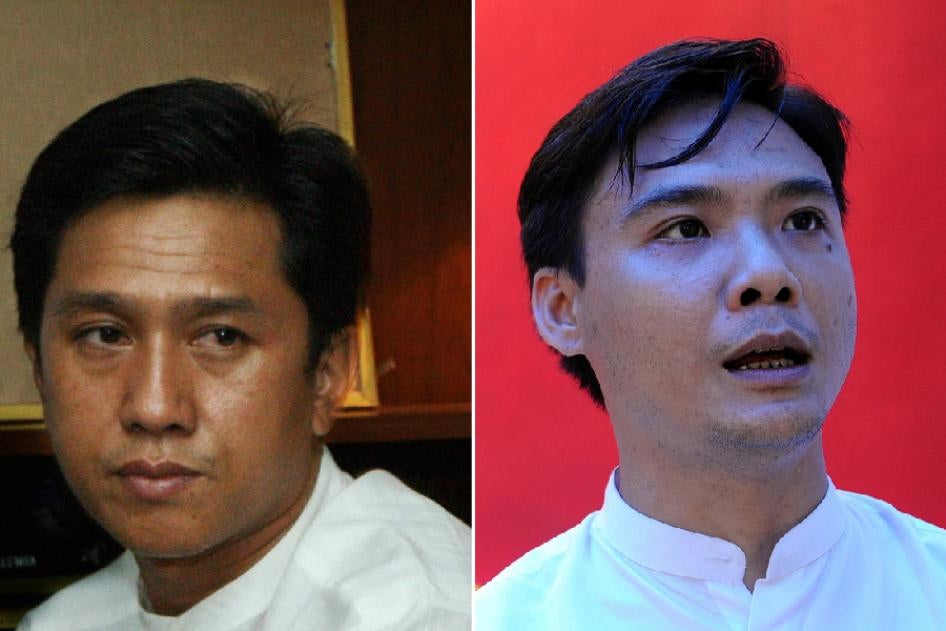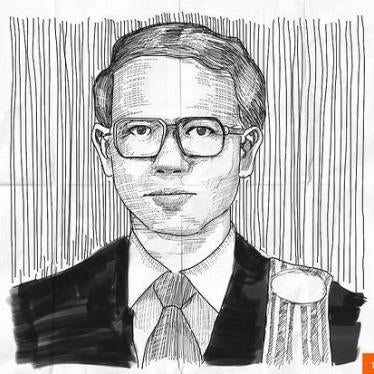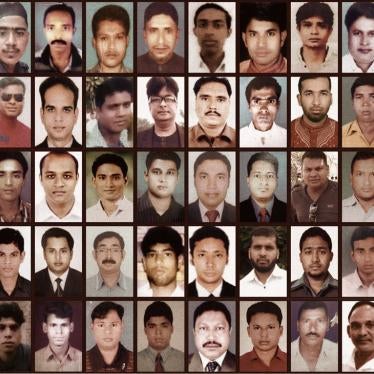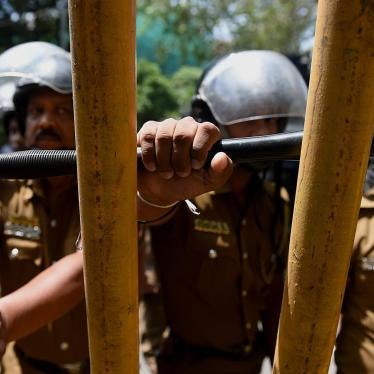(New York) – Myanmar’s military junta announced on June 3, 2022, that it would execute four people whose appeals were rejected following grossly unjust closed-door trials, Human Rights Watch said today. The activist Kyaw Min Yu, known as “Ko Jimmy,” and the opposition lawmaker Phyo Zeya Thaw were sentenced to death on January 21 by a military tribunal under Myanmar’s overbroad Counterterrorism Law of 2014.
Military tribunals in Myanmar have sentenced 114 people to death since the February 2021 military coup, including 41 in absentia. The United Nations (UN), Association of Southeast Asian Nations (ASEAN), and concerned governments should press the junta to immediately release all those wrongfully imprisoned, including Phyo Zeya Thaw and Ko Jimmy, and commute all death sentences.
“Myanmar military courts’ disregard of basic rights was evident in the farcical trials and death sentences of Phyo Zeya Thaw and Ko Jimmy,” said Manny Maung, Myanmar researcher at Human Rights Watch. “These secretive tribunals with their lightning convictions are aimed at chilling any dissent against the military junta.”
On October 24, 2021, soldiers arrested Ko Jimmy, 52, in Yangon’s North Dagon township. The authorities had issued a warrant for his arrest on February 13, 2021, for allegedly inciting unrest and taking part in “terrorism”, both offenses under the Counterterrorism Law. The soldiers severely beat Ko Jimmy during his arrest and tortured him in custody, his family said.
On November 18, soldiers and police arrested Phyo Zeya Thaw, 41, during a raid on a housing complex in Yangon’s Dagon Seikkan township. A military court charged the former National League for Democracy legislator and hip-hop artist under the Counterterrorism Law and the Public Property Protection Act with leading deadly shootings on pro-military targets.
A junta spokesperson, Maj. Gen. Zaw Min Tun, announced that the two men would be “hanged according to prison procedures,” but said that no date had been set for the executions. Two other men, Hla Myo Aung and Aung Thura Zaw, who were convicted for killing an alleged military informant, would also be hanged, the spokesperson said. The military has not revealed where Phyo Zeya Thaw and Ko Jimmy are, and the men have not been seen since their arrests, according to the Assistance Association for Political Prisoners.
Phyo Zeya Thaw and Ko Jimmy were arrested in townships in which the junta has declared martial law. In imposing martial law, the junta transferred all executive and judicial authority to the head of the relevant regional military command, and instituted the death penalty as a possible sentence for 23 crimes, the majority of which are not capital crimes in civilian courts.
Military tribunals have issued death sentences against defendants in rushed and closed legal proceedings, depriving those charged of their basic fair trial rights. Those on trial before military tribunals face almost certain conviction regardless of the available evidence against them. There is no scrutiny of the trials by the public or the international community. Myanmar security forces have subjected many people arrested since the coup to torture and other ill-treatment, including frequent beatings.
In May 2021, the junta formally designated the opposition National Unity Government, its parliamentary committee, and their offshoot militias as “terrorist groups” for alleged acts of incitement against the junta, seemingly to justify broad suppression and to criminalize any support for activities opposing the coup. In August 2021, the chairman of the State Administration Council junta, Sr. Gen. Min Aung Hlaing, amended the Counterterrorism Law to introduce harsher penalties for anti-coup activities that do not distinguish between acts of violence and peaceful protest, shifting the burden of proof to the accused.
Martial law regulations require the State Administration Council chair to approve all execution orders. They also state there is “no appeal for decisions or convictions handed down” by a military tribunal. The only option for defendants sentenced to death is to apply to the junta chair within 15 days of the conviction to reverse the decision or to reduce the sentence. The applications can only be filed through prison officials, not lawyers, Radio Free Asia reported. A source who is familiar with Phyo Zeya Thaw and Ko Jimmy’s cases said the families were unaware of the appeal efforts until the junta’s statement to the media.
The UN spokesman, Stephane Dujarric, said he was “deeply troubled” by the military’s decision to proceed with the executions of political dissidents. “This is a blatant violation of the right to life, liberty, and security of person as per Article 3 of the Universal Declaration of Human Rights,” he said.
Human Rights Watch opposes the death penalty in all circumstances and has long called on Myanmar to ban all capital punishment. Capital punishment is unique in its cruelty and finality, and is universally plagued with arbitrariness, prejudice, and error.
Since the February 2021 coup, junta security forces have carried out mass killings, torture, arbitrary arrests, and indiscriminate attacks on civilians that amount to crimes against humanity and war crimes. The security forces have killed over 1,800 people, including at least 130 children, and arbitrarily arrested over 13,000.
Australia, Canada, the European Union, the United Kingdom, and other countries that have banned capital punishment, as well as ASEAN member states, should call for the release of all those wrongfully detained and the commutation of death sentences. All concerned governments should agree on a stronger, coordinated effort to impose or enhance targeted sanctions against senior military officials including by increasing restrictions on Myanmar’s foreign currency revenues.
“The junta’s threats to execute Ko Jimmy and Phyo Zeya Thaw after sham military trials should be dropped immediately,” Maung said. “Concerned governments should use concerted levers of pressure to stop these executions, and be crystal clear that executing people after unfair trials will have consequences.”








